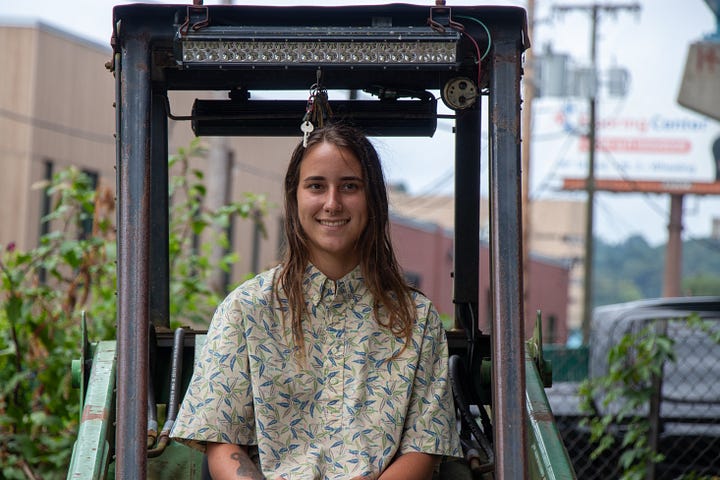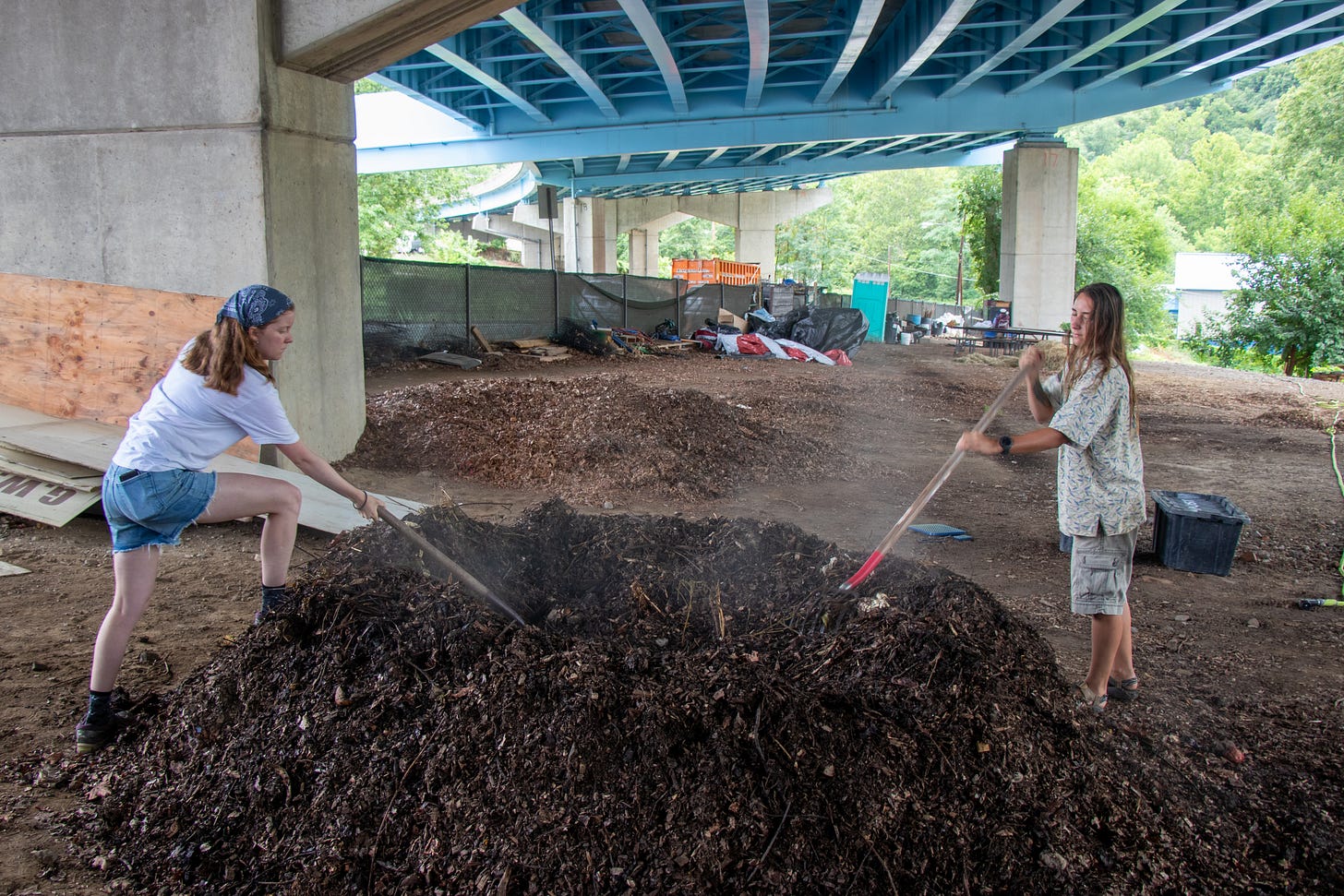Black Gold: Turning Waste Into Wealth
Cara Delaney and Chloe Lefchak are offering Wheeling residents a chance to compost their kitchen scraps. They hope it’ll lead to a broader conversation about waste reduction and sustainability.
WHEELING — Drive west along Interstate 70 and wind your way through Wheeling’s eastern neighborhoods. Pass Wheeling Park, the hospital, and Krogers. Just before you reach the tunnel take Exit 1B south onto U.S. Route 250.
From above, the scenes are familiar to any urban highway. 250’s four lanes carve through East Wheeling before settling on the eastern edge of South Wheeling heading south towards Moundsville. At eye level are the roofs of houses, churches, and the nation’s largest twin pop factory. Below you, like most underbellies of viaduct roadways, are unassuming parking lots and squalid fields behind metal fencing.
Historically, what is now shaded under East Wheeling’s portion of 250 was home to a dense neighborhood of mostly working class Wheelingites. At the end of the 1970s, though, city and state officials acquired property between 18th and 19th Streets, bulldozing dozens of homes for the highway project. For decades, the once thriving community sat disused as a brownfield.

Walking underneath 250 at the corner of 18th and Wood Streets you’ll see something unique—a point where urban and rural landscapes collide. Here sits Farm 18, a one acre farm site operated by Grow Ohio Valley since 2011. Tomatoes, peppers, squash, spinach, lettuce, blackberries, raspberries, apples, and flowers line the sloping field just outside of the highway's shadow—an island of greenery in a sea of concrete.
The site itself could tell dozens of stories. How a small group of impassioned citizens turned an empty lot into a successful farm, how the organic produce grown here feeds the surrounding communities, how bricks and other residential artifacts are still found in its soil, how groups of people young and old have their first on farm experience deep within an urban core, et cetera.
Inherently, this project is one of sustainability, reclamation and stewardship of the land and its natural resources. Most of GrowOV’s work is well known around town, but less well known beneath the underpass and beside one of its towering pillars exists a pilot program for waste reduction—a compost pile.


Running the compost program are two women—Cara Delaney and Chloe Lefchak. Neither are originally from Wheeling, or West Virginia for that matter. Delaney hails from Charlottesville, Va., and Lefchak from Naples, Fla. While neither grew up in town, they each have chosen to do what they can to better the community they now call home.
Delaney studied sociology and public health at the College of William & Mary. While in school, she says compost was familiar in the university’s community. Similarly, the idea of taking your food scraps and turning them back into soil is known in the Mountain State, where many folks have rural connections. Living in the city, limits one’s capacity to compost waste, though.
“Composting is a process of essentially recycling nutrients,” Delaney said. “We’re taking fruit and vegetable scraps which, of course, came from the ground, and we’re processing them so that they can be used as fertilizer to grow new fruits and vegetables.”
Growing up in Florida, Lefchak’s family ran several compost piles, as well as a worm composting setup. This experience in keeping food waste from the landfill has continued with her throughout her life. On moving to Wheeling, Lefchak carried with her the value of waste reduction and sustainability.
“Making compost from food scraps is diverting lots of waste from the landfill,” Lefchak said. “The more waste we can divert, the better. And if you have a garden at home—or even just landscaping—being able to make your own fertilizer that’s organic is really important in keeping a healthy garden.”



Originally, the compost project at GrowOV catered toward its staff and the organization’s internal waste. However, in June, Delaney and Lefchak expanded their program allowing community members to drop off their waste during the organization’s community-supported agriculture, or CSA, program.
Currently, 35 residents participate in the program contributing a combined 60 pounds of waste per week to the pile. Each member pays a fee of $15 to $25 to purchase collection buckets, fuel for the skid steer used to turn it, and cover labor costs. Through October, participants can drop their scraps off at the Public Market in Downtown Wheeling. The pair also offer a collection site at Farm 18.
“People are really excited about it,” Delaney said of the community collection program. “It seems like people here are trying to reduce their environmental impact, and this gives them a way to do it without having to manage the compost pile themselves.”

A successful pile consists of carbon-rich materials (browns) like leaves, woodchips, and sticks, and nitrogen-rich materials (greens) like kitchen scraps, weeds and clippings from the farm, and expired produce. The pile needs access to water and air. Delaney says caring for the pile is much like caring for a person.
The key, or “the engine” as Delaney puts it, are the microorganisms that exist within it. Think bacteria, fungi, mealy bugs, worms, flies, and other decomposers. Delaney and Lefchak monitor the pile regularly, ensuring its temperature stays between 130 to 150 degrees, the temperature at which this tiny life works most efficiently. “Any higher,” Delaney said, “and it starts to kill off the beneficial organisms. Any lower and we aren’t killing the pathogens or weed seeds.”
When the temperature of the pile drops, it’s a good sign that more food scraps can be added. Once every other week, Lefchak, using a skid steer, turns the pile ensuring what was outside is inside and vice versa. This not only ensures contact between the browns and greens, but adds oxygen as well. The use of the skid steer allows the pair to manage a larger pile expanding their capability to accept waste. And, through their work, waste is able to break down in a more environmentally sustainable way.

Food waste that enters landfills breaks down in an anaerobic—without oxygen— manner. In this setting, methane gas—a greenhouse gas 30x as potent as carbon dioxide—is produced. Landfilled scraps also hold no value to our community soil. In contrast, compost piles produce carbon dioxide as a byproduct.
As a compost pile reaches the end of its lifespan, greens added start to break down slower. At that point, the pile is cured and a nutrient-dense soil amender is the end result. Participants in the community scrap collection will receive a portion of the compost, with the rest going back into the rows at Farm 18.
While small-scale now, the pair hopes to see the project expand.
“I’d really like to see Wheeling move in a more sustainable direction,” Lefchak said, “like thinking about our impact on the environment more.” Lefchak also works for the Ohio County Solid Waste Authority, combining her knowledge of compost with the Authority’s mission of diverting waste from landfill. Partnering with GrowOV for their compost pilot program, OCSWA’s goal is to offer municipal compost in the next five years through a USDA grant program.
Currently, Clarksburg is the only city in the state offering regular municipal composting—albeit of yard waste alone. Still, it’s a model for how other cities can offer a similar service to their community. In return, residents can receive a portion of the compost produced by the facility.
While our society considers how best to reduce its impact on the environment, waste reduction must be a topic for discussion. It’s estimated that 50% of material that goes to landfill is compostable. This waste creates potent greenhouse gasses, and the energy expended to transport the it to landfill only furthers our environmental issues.

Delaney and Lefchak are that alternatives exist. Municipal compost will reduce the size of landfills and frequency of trash pickups, saving cities, taxpayers, and utility ratepayers money. As a bonus, the community has access to the valuable resource of compost that improves soil quality, land fertility, productivity and beauty.
For more information about GrowOV’s composting program, visit their website.

